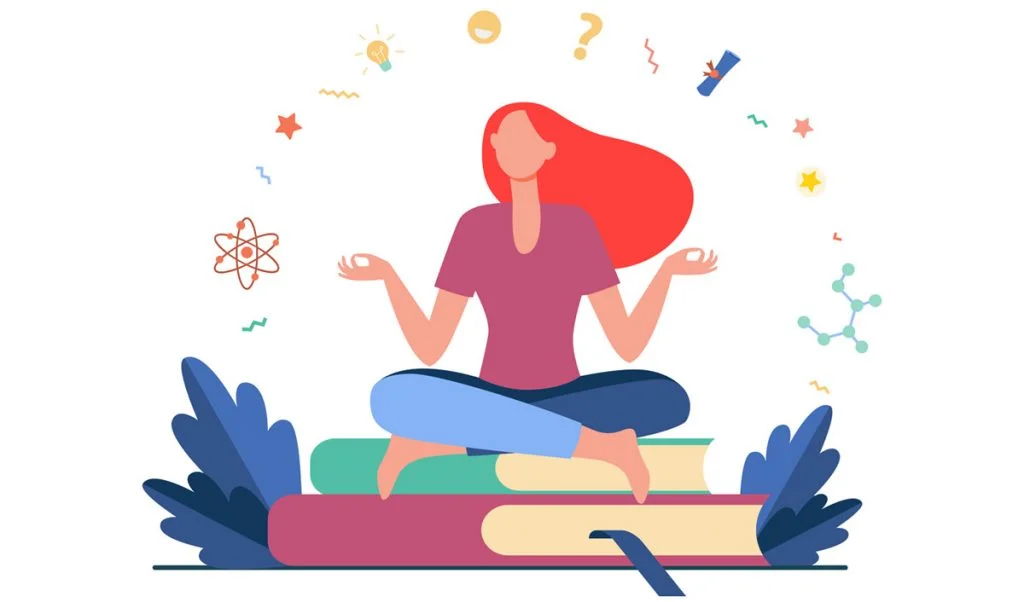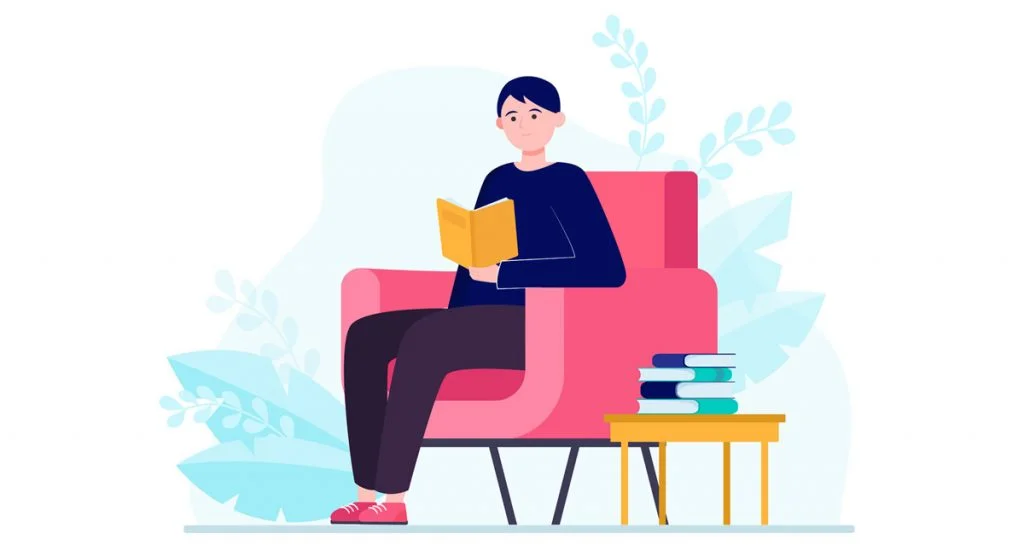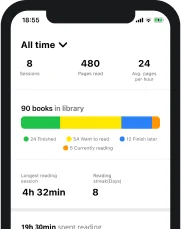Being a book lover comes with many advantages for your body and mind. From stress relief to more knowledge and being an overall better human being, reading can literally change our lives for the better.
It does however come hand in hand for most of us with owning a lot of books, which at some point will inevitably become a cluttered mess. Learning how to declutter books is one of the essential skills you need to learn in order to become a better and more organized reader.
When Can You Consider That Your Books Are Cluttered?
Before we start learning how to fix the issue, it’s important to have an in-depth understanding of the problem. So what’s book clutter exactly and how does it affect us and our reading habits?
A clutter, in general, is defined as any space that isn’t well organized, a place filled with things you no longer need or even forgot you own, or a small place containing more things than it would need to contain in order to remain usable.
If we apply this to books, it’s easy to figure out that a book clutter can mean anything from a disorganized shelf filled with books in random order to a stack of books you never get around to reading sitting on your nightstand, gathering dust.
The Negative Impact of Clutter on Our Reading Habits
While the negative effects of clutter in our home have been extensively studied and have been found to be quite serious, no studies have specifically focused on book clutters. But even so, some of the effects that readers and decluttering experts (yes, they exist) have reported are:
- You will read less
- You will be unable to focus
- You will start feeling the pressure of your reading list
- You will not be as effective at reading
As they say, a cluttered desk means a cluttered mind. The same is true when it comes to your bookshelf.
How to Declutter Books?
Getting rid of book clutter can be a challenge. Luckily, there are several ways we can go about fixing the problem and we know all of them and soon you will too! Finding the best way to declutter books is a process and it will require a certain level of determination, but it will definitely be worth it once you’ve done it.
There are many tips for decluttering your books out there, but we created a curated list of the most important ones.
1. Decide to Let Go
Starting the process of decluttering books will be an emotional journey for most of the part. We tend to get attached to our possessions in general and books take a special place in our hearts especially because we tend to associate them with feelings we had and events that took place while we were reading them. Even if we don’t realize it at first, books have very deep roots in our lives.
That is why getting rid of book clutter needs to start with a strong decision on your part. You need to be convinced that you need the book declutter and that you are willing to see the whole process to the end.
2. Think Realistically About the Books You Actually Need
Once the decision has been made, you need to start planning your declutter and start visualizing the end result. There are a couple of questions to ask when decluttering books.
What are you decluttering? A single bookshelf, a nightstand, or the entire book collection in your bookcase?
How to decide what books to keep? Start thinking about what you would like to keep at hand, what can be put in a less visible and accessible place, and what you need to throw out.
Our recommendation is to reserve the place on the accessible bookshelf for books you are planning to read, to keep the books you’ve read, loved or planning to read again out of sight, and to simply get rid of the ones you’ve finished and have no plans to revisit.
3. Move Your Book Collection Online
Living in the 21st century comes with the benefit of always having the power to own things in a digital format. If you feel that owning physical books puts too much of a strain on your day-to-day attempts of keeping a decluttered home, buying your favorite titles in a digital format is a great idea.
Buying an e-reader and e-books actually comes with even lower costs than physical ones and keeps your home 100% clutter-free.
4. Set Limits for the Number of Books You Keep
Once you’ve made your decision about the places where your new and old books will be stored, you will obviously realize that the number of books each can hold is limited by the space you have.
Determine how many books can be stored on your visible bookshelf and how many you can store out of sight without making a mess.
5. Organize Your Books
It may sound counterintuitive, but you will need to make a huge mess before you can actually declutter your books. It will need to get worse in order to get better.
That being said, you should gather all the books you own, sit down next to a huge pile of books and take each one and decide its fate. Create smaller piles for the books you want to keep in a visible place, the ones you will keep out of sight, and the ones you will throw out or give away.
Remember to take into account the predetermined number of books that fit into each section.
6. Use a Reading Tracking App
One thing that can be of amazing help when it comes to decluttering your books is, perhaps surprisingly, reading tracking apps like Basmo. There’s a lot these little wizards can do and some of the features can be of great help for organizing your books and even your reading habits.
For example, Basmo allows you to create personalized book collections where you can add the titles you own. This virtual way of cataloging books will allow you to keep your book collection under strict control and avoid the infamous book clutter.
Another feature from Basmo that is particularly helpful in keeping a clutter-free house is the reading list creation tool. You can simply search for books by title and add them to the virtual reading list. You can then arrange your bookshelf to match the titles of your reading list and keep the clutter under control.
Not only that, but it will also make the process of getting rid of paperback books a lot easier for you since you will always have their titles and the notes you make within the books saved on your mobile device.
7. Take a Break From Buying New Books
As obvious as it may be, it needs to be said. Buying new books while the decluttering process is ongoing is clearly a bad idea. You should refrain from purchasing any new titles for a while until you’ve successfully decluttered your book collection.
8. Give Away Books You No Longer Need
Now, the decluttering process has left you with a pile of books you no longer want to have in your house. You could throw them away, but that would be incredibly wasteful and disrespectful. Books need to be passed along, never thrown away.
Ask your friends and family if they want them, donate them, or even resell them if you think it’s worth it. Your trash may be somebody else’s treasure and since books are knowledge, it’s never a good idea to just throw them out.
9. Think About the Future, Not the Past
An important thing to remember throughout the whole decluttering books process is to always think ahead. Don’t allow yourself to stay hung up on the past and on the value of your possessions.
It’s a lot better for you to let the way you organize your books symbolize that you live in the present and the future, not in the past. Unless you absolutely loved a book and really plan to read it again, it has no place on your bookshelf. That place is reserved for what you plan to read in the future.
10. Use the MUSTIE Method
If your book collection is particularly extensive, the suggestions we made above for decluttering bookshelves may turn out to be insufficient. If that is the case, there is a tried and tested method used by libraries for years now, called the MUSTIE method. MUSTIE is actually an acronym for:
M = Misleading (for old books presenting outdated information)
U = Ugly (for books that are no longer presentable and cannot be on display)
S = Superseded (a more recent, updated edition has been released or the book can be replaced by a superior one)
T = Trivial (no longer bringing any value to your book collection)
I = Irrelevant ( of no interest to you)
E = Elsewhere ( this one does not apply to your personal book collection)
While this may seem excessive for most of us, people with valuable and extensive book collections will find this method extremely effective and useful.
Questions to Ask When Decluttering Books
The process of decluttering books is clearly one that will require a lot of introspection. We are usually emotionally connected to the books we own and for good reason. They can be our valued companions, they can take us on imaginary trips to alternate universes, or treasured gifts from our loved ones. Let’s see what you should ask yourself while decluttering books in order to stay on top of the process.
1. Have I Read This?
This is clearly one of the most important questions you should ask yourself while decluttering books. Novels that you already read are generally never going to make it back on your reading lists. So, if you have a couple of books you’ve already read, you should probably let go and set them aside in your “to give away” or “to sell” piles.
Of course, some books are too valuable to give up, whether that is because of their sentimental value or because you keep going back to them and rereading them.
2. Will I Read This in the Future?
We all hold on to a lot of books that we plan to read sometime in the future. When decluttering books, you should seriously ask yourself if you really think that you will read particular books in the future.
In more cases than you might think, the honest, down-to-Earth answer is no. Putting a real question mark on your mental process while decluttering books will make you more honest with yourself and will result in a more realistic outcome.
3. Do I Own Other Books on This Topic I Would Rather Read Than This One?
This is probably one of the most important questions you should ask yourself when it comes to non-fiction books. Usually, when we are interested in a particular topic, we tend to buy more titles on that subject. We read one or two books, and the rest remain in a pile on our bookshelf we don’t touch for years.
Whether it’s basic economics you were trying to learn at some point, self-help books, or any other type of non-fiction book, you should always analyze your book collection and decide honestly if the book in your hand really is more relevant than others on the same topic. If it isn’t, you should figure out a way to get rid of it.
4. Did I Keep This Book Around Because I Want to Read It or Because It Was a Gift?
More often than not, we don’t exactly keep books around for the right reasons. We should always keep in mind that books have the main purpose of being read. That is where their true value lies.
While there is nothing wrong with keeping books that have sentimental value, the truth is that we sometimes keep books around out of guilt more than because of how much they mean to us.
Receiving a book we have no interest in reading from someone close to us will often result in us keeping that book around simply because we feel too guilty to get rid of it. It’s easy to understand why you might feel this way, but you should know that this is usually a certain way to end up in a very cluttered home.
5. Is This Title Still Relevant to My Life or My Current Interests?
We all go through different phases in our lives. We develop different interests over the years, but not all of them stick with us for a long time. While we might have developed a true love for learning about woodworking in our mid-20s, it’s quite likely that we no longer have the same passion for this topic in our late 30s.
So that pile of books about woodworking seems pretty useless now, right? Take a deep look within and decide whether you still have a reason to keep these books about a passion that faded away a long time ago.
6. How Hard Would It Be to Rent This Book From the Library if I Ever Need It Again?
More often than not, we tend to hold on to things we think we might need in the future, without taking into account what level of effort would be involved in the process of simply getting that thing again in the future if we ever need it again.
Books are no different. We think we might need that textbook from college about a particular topic we are still interested in, but years go by and all it does is take up space and gather dust. Consider how long it would take you and how much it would cost you to simply rent that book in the future if you need it instead of keeping your own copy. Spoiler alert: it’s a lot easier than you think.
7. Would This Book Be More Valuable in the Hands of Another Person?
As I mentioned before, books are meant to be read. A book sitting on a bookshelf in someone’s home is not nearly as valuable as it would be in the hands of a person who would read it.
While there is certainly no shortage of books in our world, think about the true value your book would have in the right hands instead of sitting on your nightstand never to be touched again. If you consider the good your book could do in the hands of the right person, you will find it a lot easier to simply give it away.
8. Is This Book More Valuable Than the Space It Takes up on My Bookshelf?
Regardless of the reason you might think a particular book is valuable to you, you should always consider the value of the space it takes up on your bookshelf. While it won’t make a huge difference if you take this approach with individual titles, you would be surprised to see how effective it can be when things start adding up.
Books that have less value than the space they take up should leave your home one way or another. That space can be filled up with more valuable titles or can give you much-needed breathing room by clearing up your living space.
How Does Marie Kondo Declutter Books?
If you don’t know who Marie Kondo is, you should know that this Japanese writer and consultant has managed to make a name for herself by teaching others how to better organize their homes and declutter them. She published several books on the topic, including a best-seller “The Life-Changing Magic of Tidying Up”, and she was listed as one of Time magazine’s “100 most influential people” in 2005.
Her philosophy, also known as the KonMari method, consists of taking all of one’s items from a specific category (clothes, books, and any other belongings) and handpicking only the items that “spark joy”. The original term in Japanese describing this is “tokimeku”, which roughly translates to “flutter, throb, palpitate”. Every item that doesn’t fall in the tokimeku category needs to be thrown out or donated, eliminated from one’s home.
While the method has been tested by millions of people all over the world and claimed to have changed many lives, the principle applies to books only to a certain extent. As I was explaining earlier, there is a lot more emotion involved in owning books or having a book collection than items of clothing for example. And that is not a bad thing, our emotions are partially responsible for where we are as a species and we need to understand and embrace them rather than eliminate them.
Here’s a step-by-step guide to applying Marie Kondo’s Konmari method for decluttering books:
Step 1. Gather all your books in a pile in the middle of the floor or split them into categories if your collection is too extensive:
- General books
- Children’s books
- Magazines
- Art books/Coffee table books
- Practical books
Step 2. Take each book and decide if it sparks any joy
Step 3. Get rid of all the books that leave you indifferent
Step 4. Neatly arrange the ones you decide to keep
That being said, while some principles from Marie Kondo’s method can be applied to the book decluttering process, our recommendation is to stick with the way of doing things we presented above.
Using a reading app like Basmo can be a lot more effective than the Marie Kondo decluttering method. You can create reading lists, and book collections that can be adapted to the space you want to allocate to your books, you can edit the lists anytime from anywhere and update them according to your purchases or desires. Cataloging books comes easier than ever before and that is one key aspect of the book decluttering aspect Marie Kondo’s method mentions nothing about.
Conclusion
Learning how to declutter books is essential if you want to be effective and organized with your books and reading habits. With help from reading apps like Basmo, you can achieve the results you always dreamt of a lot easier than you would expect. All you need is a little determination and a strong desire to curate your book collection.







